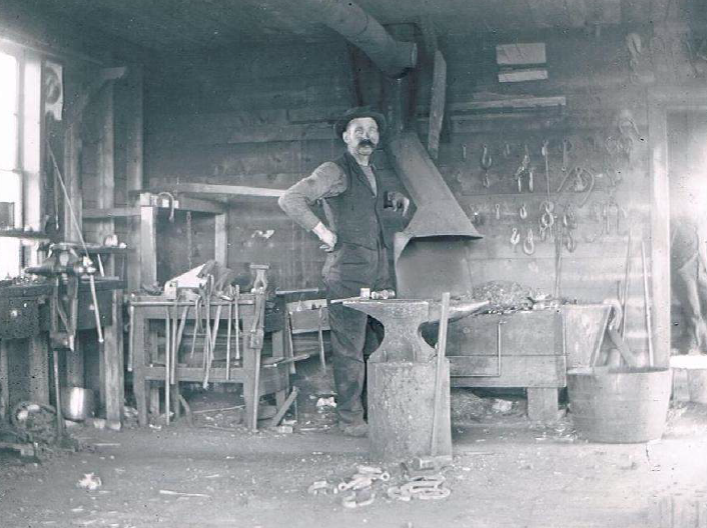FRIDAY, APRIL 8, 2022

NOTE: The symposium will begin with a brief presentation at the Ramada followed by a tour of Compass Inn Museum. Admission to the Museum is $10. A shuttle to the Compass Inn Museum will be provided at no charge; however, donations will be accepted to cover the cost.
Click here to Register for the event on the Society for Pennsylvania Archaeology Website!
- Schedule for Friday April 8th:
- 10:00 am – 5:00 pm SPA Registration in the Ramada Lobby
- 9:30 am – 12:00 pm PAC Board and Business Meeting
- 12:00 pm – 1:00 pm Wrap Lunch at Ramada or Lunch at Other Local Eatery
- 1:00 pm – 4:45 pm PAC Symposium: Archaeology of Blacksmith Shops Workshop/Compass Inn Museum Tour
- Organizers: Susanne Haney, Jessica Schumer-Rowles, and Angelia Jaillet-Wentling
- 1:00 pm – 1:45 pm Archaeology of Blacksmith Shops Intro
- Ryan Rowles and Jessica Schumer-Rowles (Markosky)
- 2:00 pm—2:15 pm Shuttle to the Compass Inn Museum
- 2:15 pm – 4:45 pm Compass Inn Museum Tour and Workshop
- 5:00 pm – 5:15 pm Shuttle to the Ramada
There will be three rotating activities for participants at the Compass Inn Museum:
- 1) Blacksmithing demonstration
- The Compass Inn Museum blacksmith shop was established in a reconstructed barn in 1980. It has been in use for blacksmithing demonstrations for the past 40 years. The shop houses a collection of historic blacksmithing tools and equipment. These materials vary in their associated time period and blacksmithing specialty, including general repair, farriery, agricultural repair, and railroad. The shop has a stone forge. It maintains functioning bellows, as well as an electric blower. It is outfitted with two anvils, a post vice, mandril, swage block, shoeing sling, drill press, and many other items. Viewing the collection of tools and equipment is useful for becoming familiar with the types of artifacts that can be recovered from a blacksmith-related archaeological site. Additionally, because the shop is regularly in use, some patterning on the dirt floor is visible and reflects various activity areas. Similar patterning can be seen during excavations of an intact blacksmith shop floor. Blacksmith Ed Appleby has worked in the Compass Inn blacksmith shop for many years. He will demonstrate blacksmithing techniques and the use of various tools. There will also be a focus on blacksmithing technologies, archaeological depositional patterns, and methods useful for interpreting these types of sites.
- 2) McQuilken Blacksmith Shop Exhibit of Artifacts, Barnhart Room
- The McQuilken Blacksmith Shop site (36IN0463) is located in the village of Home in Indiana County. The site was identified and subsequently excavated in association with a federally-funded bridge replacement project in PennDOT District 10-0. Archaeologists from the Markosky Engineering Group, Inc. conducted Phase I survey through Phase III data recovery of the National Register of Historic Places eligible site. The shop was in use between ca. 1856 and the early 1950s. During its 100 years in business, the shop went through many changes—the Civil War, The Great Depression, the use of draft horses, the rise in popularity of the automobile, World War I, the use of electricity, the mechanization of agriculture, World War II, and the decline of the trade of blacksmithing. The McQuilken Blacksmith Shop site was a largely intact archaeological site with a shop floor, evidence of anvil locations, two or three forge locations, and workbenches. The various blacksmiths in the shop were general blacksmiths who were capable of horseshoeing; repairing wagons, early automobiles, and agricultural machinery; sand casting; and general tinkering. A select display of artifacts, including various types of blacksmithing waste material samples (slags and hammerscales) recovered from the excavations of the McQuilken Blacksmith Shop Site will be displayed in the Barnhart Room of the Compass Inn Museum.
- 3) Tour of the Compass Inn Museum
- The Compass Inn is a historic Inn and stagecoach stop located along Route 30 in Laughlintown. The log portion of the inn was built by Philip Freeman in 1799. In its earliest years, the inn was frequented largely by drovers. In 1814, Robert and Rachel Armor purchased the inn and named it “Compass Inn”. The completion of the Philadelphia Pittsburgh Turnpike in 1817 resulted in increased stagecoach traffic. To increase business and meet the market needs, the Armors expanded the inn by adding a stone addition, a new cookhouse, and a new stable in 1820. They also refined the interior of the inn to accommodate more prosperous guests. In 1863, Robert and Rachel’s son, John, renovated the property into a residence for his family and he converted the old tavern room into a general store and post office. Multiple generations of the Armor family resided in the old Inn. Charles Armor, grandson to Robert and Rachel, recorded nearly 500 journals in his lifetime, recording historic events and daily activities in the 1870s through 1930s. He also opened a museum of local antiquities. The last Armor descendant to live in the inn allowed for it to be sold to the Ligonier Valley Historical Society. Today the Compass Inn building is listed on the National Register of Historic Places. A cookhouse, stable/blacksmith shop, and barn have been reconstructed on the property. The tour focuses on stagecoach travel and the inn experience ca. 1820.
- This workshop is in partial fulfilment of mitigation commitments by FHWA and PennDOT for adverse effects to the McQuilken Blacksmith Shop site (36IN0463) as a result of the SR 0119 Sec 463 Home Bridge #3 project.

